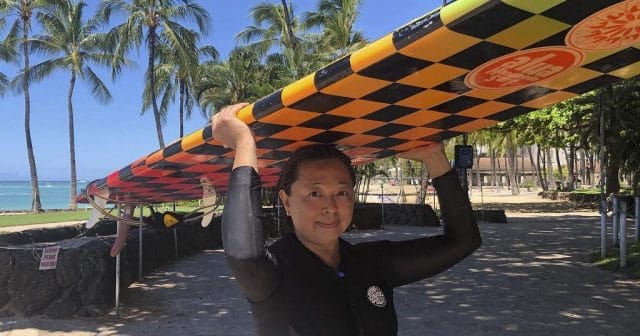
For some Native Hawaiians, surfing’s Olympic debut is both a celebration of a cultural touchstone invented by their ancestors and an extension of the racial indignities seared into the history of the game and their homeland.
The Summer Games in Tokyo, which open July 23, serve as a proxy for that unresolved tension and resentment, according to the Native Hawaiians who lament that surfing and their identity have been culturally appropriated by white outsiders who now stand to benefit the most from the $10 billion industry.
“If you have these kind of emotional connection to a space like we’re talking about with Hawaiians and surfing in particular, then you become naturally protective of it,” said Isaiah Helekunihi Walker. “Especially when you suffer with so much loss elsewhere.
Hawaiians viewed surfing as a spiritual art form and egalitarian national pastime that connects them to the land and sea.
The white European settlers who first arrived have at times both vilified and capitalized on the act of stylishly riding ocean waves on a board for fun and competition.
Today, whites are seen as the leaders and authorities of the sport, as surfing’s evolution is now a legacy shaped by white perspectives: from practically Hawaiian birthright to demonized water activity, and California counterculture symbol to a global professional sports league.
Whites first arrived on the island in the 1700s, bringing with them disease that nearly wiped out the Hawaiian population, conquest to take over the land and its bounty of natural resources, and racist attitudes that relegated Native Hawaiians to second-class citizenship.
An effort to ban surfing was in part because Christian missionaries disapproved of the nudity on display.
Though it was three Hawaiian princes who first showed off surfing to the mainland in 1885 during a visit to Santa Cruz, California, white businessmen are credited with selling surfing and Hawaii as an exotic tourism commodity for the wealthy.
“I think people should really appreciate that Hawaiians brought surfing to the masses and it would be nice if they were kind of recognized for that at the Olympics,” said Richard Schmidt, who was among the white Californian pro surfers as the sport began to develop competitively in the 1970s. “This is something that Hawaiians have gifted to the world.”
Yet critics say the business and branding aspect of the sport and lifestyle largely remained white-centered, and the Hawaiian heritage of it whitewashed into a blonde Californian image.
The effort to take back surfing’s narrative is why sovereignty activists applied for a Hawaii Kingdom national team to compete at the Olympics. Their longshot request hinges on the fact that there was no ratified treaty that ever formally dissolved Hawaii’s autonomy. The United States annexed Hawaii in 1898 after the overthrow of the Hawaiian monarchy by U.S.-backed forces in 1893.
Bid to compete as independent entity
A statement from the International Olympic Committee, which has largely ignored the request, noted only that applicants must be an “independent state recognized by the international community.”
This geopolitical dynamic will be on display when Carissa Moore and John John Florence are in the surf zone to compete for the U.S.
Neither is eager to discuss their views on the matter but they are two of professional surfing’s biggest stars who have long competed under the Hawaii flag in the pro league, as the World Surf League recognizes Hawaii as a “sovereign surfing nation.” Moore as the reigning female world champion is also the only Olympic surfer of Native Hawaiian descent.
“The hurt and the wounds go back really far,” Moore said. “I usually compete under the Hawaii flag all year with the WSL, but that’s not a huge focus right now. I think that I can still represent both, even if I’m not wearing the flag on my sleeve.”
The International Surfing Association, the Olympic governing body for surfing, has pledged to honor Hawaii and Duke Kahanamoku, the godfather of modern surfing, during the Games.
Kahanamoku was a Native Hawaiian swimmer who won five Olympic medals and introduced the sport in surfing exhibitions in California, New Jersey, New Zealand, and Europe. He lobbied the IOC at the 1912 Summer Games in Stockholm to include it in the Olympics and was the ultimate waterman, whose legacy also includes popularising flutter swimming kicks and spreading the concept of lifeguarding and water rescue to the masses.
“I think the best thing that we can do is take the time to listen, to understand, to be empathetic,” said Moore. “To try to make up for it the best that we can moving forward.”
AP

